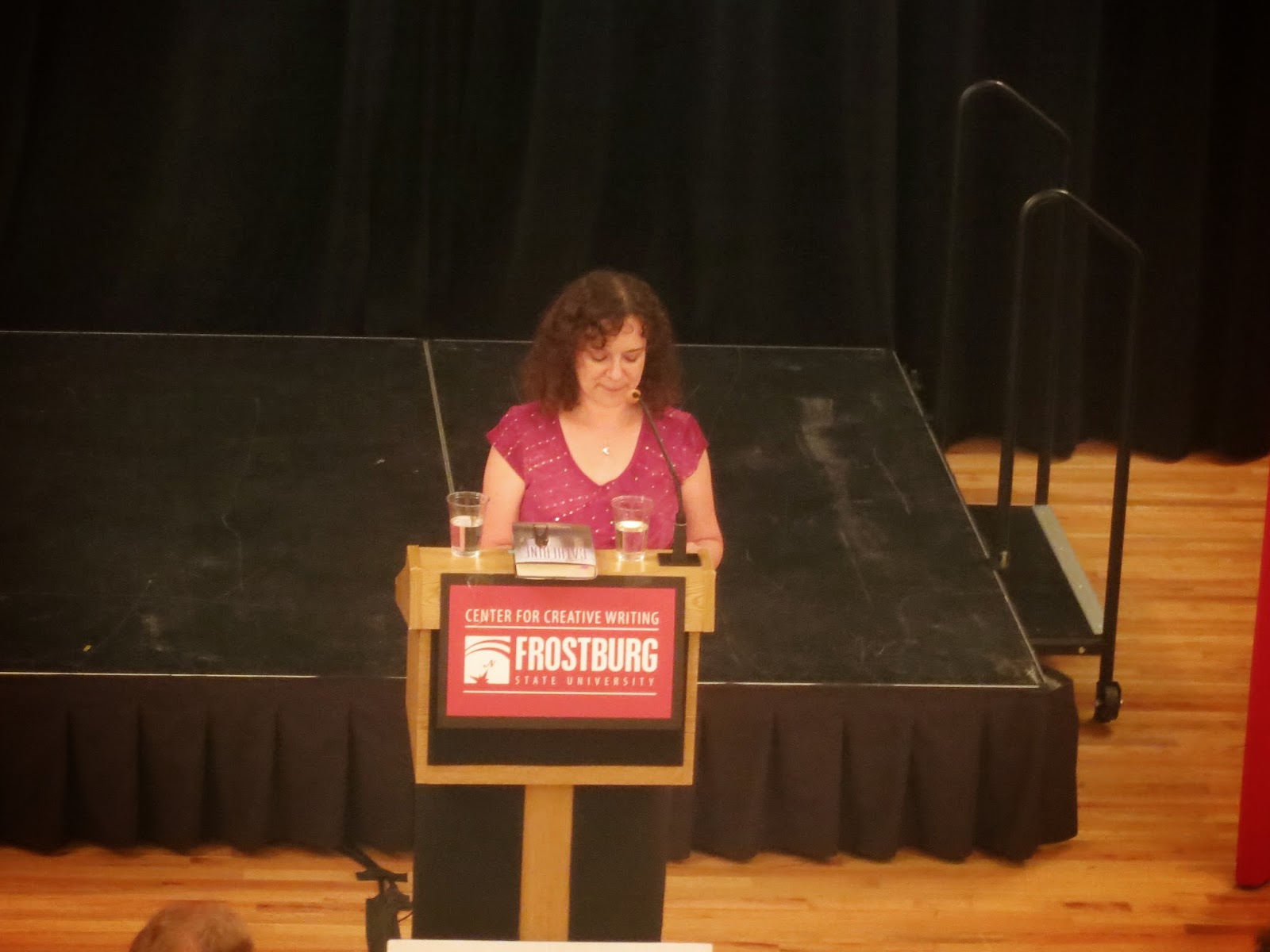For those who could not attend, or for those who want to revisit the weekend, we have provided a rundown of the conference below. Enjoy!
DAY 1
During the first night, everyone simply checked in and sat back to
enjoy a reading after dinner.
Gerry LaFemina (Director of the Center for Creative Writing) kicked things off by introducing the readers for the night, Bruce Weigl and Marion Winik.

Marion Winik read some of her nonfiction work, including some sections of Glen Rock Book of the Dead.
Bruce Weigl shared some of his poems and also read some poetry in Vietnamese followed by the English translations.
DAY 2
Participants were up bright and early the next morning to attend the
first writing prompt session of the conference, led by Gerry LaFemina.

This session focused on character, and participants shared work from every genre from nonfiction to poetry.
After the writing prompt session, the workshops were underway!

(Left): Marion Winik reviews some work samples with her nonfiction students.
(Right): Brenda Clough leads the sci-fi/fantasy/horror workshop.
Following a lunch break, the faculty members split into two groups to discuss writing with the participants:
Clint McCown, Marion Winik, and Brenda Clough formed the panel that covered the topic of writing prose...
...while Gerry LaFemina, April Lindner, and Bruce Weigl led the discussion for writing poetry.
The last event of the day was the fiction reading held at the Lewis J. Ort Library on the Frostburg State University campus.

Brenda Clough shared some of her science-fiction work during the reading -- a story of a soldier who went missing in a blizzard and woke up hundreds of years in the future.
Clint McCown read a section of his novel War Memorials, sharing a troubling scene for the protagonist Nolan Vann and his pet lizard Randall.
DAY 3

The day began just as the one before -- with a writing prompt session, this time led by YA author April Lindner.

The participants later split into their
four separate groups (fiction, nonfiction, sci-fi/fantasy/horror, and
poetry) for another round of workshops.
After everyone took a break to relax and eat some lunch, Gerry LaFemina and April Lindner led the next reading.
Gerry LaFemina pulled double-duty at this reading, acting both as a host and as a reader. He shared some of his poetry after being introduced by a colleague. (You didn't think he would introduce himself, did you?)
Though the YA workshop had to be cancelled, April Lindner still attended the conference and read from her YA novel Catherine, a modern adaptation of Emily Bronte's Wuthering Heights.
Following the reading, all of the faculty members joined together to form the panel for the Publishing Q&A, tackling issues such as ebook versus print.
Gerry LaFemina, Marion Winik, Clint McCown, Bruce Weigl, and Brenda Clough made up the panel for the Q&A.
Bruce Weigl spotted our photographer on the balcony during the discussion and gave him a quick smile.
The day was concluded with the participant reading at Dante's on Main Street.

Work was shared from all of the genres while participants and faculty alike were there to listen. Food, drinks, good writing, and good company -- who could ask for better?
DAY 4
The very last writing prompt session was led once again by Gerry LaFemina. This time there were two different prompts...
...the first to write a piece incorporating the lyrics of a song that affected you during adolescence and the second to write a piece about a memorable movie.
After the final workshop meetings, everyone gathered together one last time at the the closing reception.
The reception was held at Main Street Books, where participants could buy books written by the faculty members and get them signed while enjoying some pizza.
After a truly memorable few days, it was time to say goodbye to new friends with the hope of seeing some of them again next year.
Bruce Weigl wrapped things up by showing off some musical skills at the store's piano -- a perfect way to end a weekend of creativity.
The 2014 Nightsun Writers' Conference was a great experience, and if you enjoyed either attending the conference or learning about it on our blog, be sure to sign up for next summer's session! We hope you liked this summary of Nightsun. To see even more pictures of the weekend, check out the Center's Facebook page. Until next year!





















